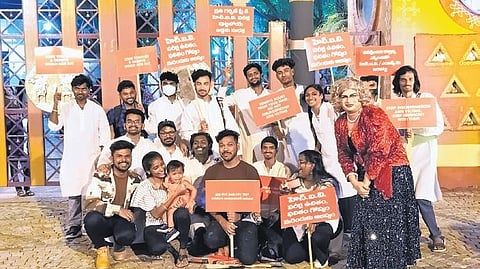Beyond the neon lights, Patruni's drag dance sheds light on critical issues
HYDERABAD: While "Chiranjeeva Sukhibhava" (live long, happily) might not typically be a blessing given to a person living with HIV, Patruni Chidananda Sastry (they/them), a renowned drag queen in Hyderabad, incorporated these unconventional blessings into the steps of their recent flash mobs performed at various locations in the city.
All eyes were on them when, wearing a glossy red gown, white hair wig and glamorous makeup, they performed a drag dance to create awareness about HIV and AIDS at the ART Centre of Gandhi Hospital on December 1, World AIDS Day.
Their dance, a kaleidoscope of expression, has not confined itself to the neon glow of nightclubs. It has spilled onto the streets, creating a colourful moving painting that not just entertains but educates.
Patruni's art transcends the ordinary, shedding light on critical issues like the dance of democracy in voting and the haunting shadows of casteism.
The common perception of drag often associates it with cross-dressing, where a drag queen, usually male, performs in a feminine manner. However, Patruni's approach to drag is distinct. "I view drag as a community-driven expression. It's not an art confined to silos. We cannot expect recognition for it by solely performing in places secluded by people who belong to a particular community," shares Patruni, who, by day, crafts code as a software engineer in a private company.
Like all good art, their performance leaves individuals in a realm of surprise, dismantling preexisting beliefs in the process.
Their recent show wasn't just about fancy drag outfits. It was a specially planned performance for the Youngistan Foundation on polling day, November 30, for first-time voters. Instead of just looking flashy, the act celebrated civic duty and the significant power each voter has. Through their drag performance, they highlighted the responsibilities we all have as voters, encouraging us to play a part in creating positive change.
Using the chipli, an instrument typically associated with devotional songs, Patruni sang a song by Lalon Fakir addressing caste discrimination at a gender conference at the University of Hyderabad. Despite not having a direct lived experience, Patruni, who recognises their belongingness to a privileged community, subtly conveyed the essence of these issues through their performance.
"Drag is like a street or neighbourhood art that can spark change," they emphasise. Whether on the streets, in corporate settings, or even in hospitals, drag has the power to normalise ideas. By taking it beyond the usual venues, like advocating for voting on the streets or motivating people in a corporate or hospital setting, it becomes a versatile tool to spread awareness.
Be it the performance on LGBTQIA+ issues performed at a music festival or about not funding the government's Garima Ghar, a shelter home for transpersons, their drag has dealt with a wide range of topics.
Their plans involve delving into projects that explore the intersection of faith and drag, contemplating the idea of devotion within this art form.
Additionally, they aspire to leverage performances for educational purposes, particularly in government schools, focusing on gender sensitisation sessions to enlighten children about diverse expressions of gender. Till now, Patruni has performed in more than 200 public spaces, including Metro stations, railway stations and even in public spaces like Lumbini Park, where a lot of children and women visit and interact.
They highlight that, unlike classical art where a man portraying a woman is widely accepted, drag is often associated with sexuality. However, Patruni emphasises their commitment to presenting a non-sexualised version of drag in public performances, focusing on universal themes. When children enquire about dressing up, the importance lies in providing age-appropriate knowledge, fostering understanding that some individuals have diverse gender expressions.
Exposure to queer individuals allows children to process and accept differences, potentially reducing the likelihood of mistreating classmates with similar traits.
As a new parent, Patruni finds a sense of grounding. During performances, they observe parents closing the eyes of their children, recognising that these actions reflect the parents' beliefs rather than the child's understanding. This experience provides insights into effective parenting.
Expressing concern about the recent tragic incident involving 16-year-old queer individual Prashnu, who took their own life due to bullying, Patruni acknowledges a fear of potential attacks amid growing hatred against the LGBTQIA+ community. The weight of responsibility extends beyond themselves, considering the well-being of two more lives, especially a child who depends on them.
(The article was originally published in the print edition of The New Indian Express, Hyderabad on December 3, 2023.)

